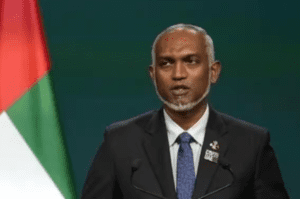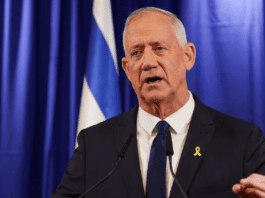
Muizzu Extends Olive Branch to India, Highlights Close Ties and Collaborative Financial Ventures.
2 min read 2024-03-23, 11:20 PM IST
In Short– President Muizzu of the Maldives has notably altered his country’s foreign policy approach, particularly towards India, marking a significant departure from earlier positions. – Despite strained relations, Muizzu now highlights India as the Maldives’ “closest ally,” signaling a desire for improved bilateral relations. – The Maldives’ president has urged India for debt relief, indicating the importance of financial cooperation between the two nations. – Muizzu emphasizes the need for ongoing projects that benefit both India and the Maldives, underscoring a shift towards a more cooperative approach for mutual gain. – The president’s gestures can be seen as an olive branch extended towards India, aiming to mend ties and foster a more positive relationship between the two countries. – These developments hold significance not only for bilateral relations but also for regional dynamics, given the strategic location of the Maldives in the Indian Ocean. |
After months of vocalizing an anti-Indiastance and taking significant steps to align closer with China, Maldives President Muhammad Muu appears to be shifting towards a more conciliatory tone. In a surprising statement, Muu emphasized India’s importance as the Maldives’ closest ally, urging New Delhi to extend developmental relief to the island nation.
Notably, the Maldives owes approximately $4.9 million to India as of the end of 2023. It’s worth noting that since assuming office as president in November of the previous year, Muu had initially exhibited a pro-China stance. Shortly after his inauguration, he even called for the repatriation of Indian military personnel operating on three aviation platforms from his country. Despite objections raised by India, the Maldives also granted permission for a Chinese vessel to dock at its ports.
In the intricate tapestry of international relations, the Maldives, a picturesque archipelago in the Indian Ocean, has often found itself at the crossroads of geopolitical interests. Over recent months, the island nation has been the focal point of attention due to the pronounced shifts in its foreign policy, particularly concerning its relations with India and China. At the heart of this diplomatic maneuvering lies President Muhammad Muu, whose statements and actions have captured global interest and speculation.
For much of his tenure, President Muu adopted a stance that seemed to distance the Maldives from India while actively seeking closer ties with China. This shift was underscored by a series of bold steps and public statements, signaling a recalibration of the Maldives’ foreign policy priorities. However, recent developments suggest a surprising U-turn, with President Muu emphasizing India’s significance and calling for enhanced cooperation between the two nations.
ALSO READ: China Disapproves of Foreign Intervention in Maldives During President Muizzu’s Visit.
The abrupt change in tone and approach has raised eyebrows and prompted questions about the underlying motivations and implications for regional stability. To understand this transformation better, it is essential to delve into the chronology of events and analyze the factors driving President Muu’s policy shifts.
President Muu’s tenure began amidst high expectations and aspirations for change. His victory in the presidential elections signaled a desire for a fresh direction in Maldivian politics, promising to address pressing economic challenges and navigate the complexities of regional geopolitics. However, his early actions seemed to veer towards a trajectory that diverged from traditional alliances.
Within hours of assuming office, President Muu made waves by demanding the repatriation of Indian military personnel stationed in the Maldives. This move, seen as a departure from the Maldives’ historical alignment with India, sent shockwaves across the region and raised concerns about the future of bilateral relations. Moreover, the issuance of a permit for a Chinese vessel to dock at Maldivian ports, despite objections from India, further exacerbated tensions and signaled a pivot towards Beijing.
As President Muu continued to assert his pro-China stance, speculation mounted about the implications for India-Maldives relations and broader regional dynamics. The Maldives’ strategic location in the Indian Ocean, coupled with its natural resources and maritime significance, added weight to these concerns. Analysts and policymakers alike scrutinized every move by President Muu, attempting to decipher the underlying motives driving his foreign policy decisions.
Against this backdrop of uncertainty and speculation, President Muu’s recent overtures towards India have caught many by surprise. In a significant departure from his earlier rhetoric, he has emphasized India’s role as the Maldives’ closest ally and called for increased cooperation and support from New Delhi. This shift in tone has reignited hopes for a recalibration of relations between the two nations and has the potential to reshape the geopolitical landscape of the Indian Ocean region.
One of the key factors driving President Muu’s apparent U-turn is the economic reality facing the Maldives. Despite initial optimism about closer ties with China, the Maldives finds itself grappling with a growing debt burden and concerns about overreliance on Chinese investments. The economic challenges exacerbated by the COVID-19 pandemic have underscored the need for diversified partnerships and sources of support.
India, as a longstanding ally and regional power, offers the Maldives a lifeline in navigating these economic uncertainties. President Muu’s call for developmental relief from India reflects a pragmatic recognition of this fact and signals a willingness to recalibrate relations for mutual benefit. The $4.9 million debt owed by the Maldives to India further underscores the importance of addressing economic concerns through bilateral cooperation.

Moreover, President Muu’s diplomatic overtures towards India may also be driven by strategic considerations. The evolving geopolitical dynamics in the Indo-Pacific region, marked by increasing assertiveness from China and the emergence of new alliances and partnerships, necessitate a careful balancing act for small island nations like the Maldives. By reasserting its ties with India, the Maldives could position itself as a more neutral player in the regional power dynamics, reducing the risk of entanglement in great power rivalries.
However, President Muu’s pivot towards India is not without its challenges and complexities. The delicate balancing act required to navigate the competing interests of India and China while safeguarding the Maldives’ sovereignty and national interests presents a formidable task. Moreover, the historical baggage and geopolitical rivalries that characterize India-China relations add another layer of complexity to the equation.
Furthermore, the domestic political landscape in the Maldives adds another dimension to President Muu’s diplomatic maneuvers. The delicate interplay between domestic politics, public opinion, and foreign policy decisions shapes the context within which President Muu operates. Any perceived deviation from the national interest or alignment with external powers could have repercussions on his political standing and the stability of the Maldives.
ALSO READ: Maldives President Takes a Swipe at India, Asserting Strength Despite Size.
In light of these challenges, President Muu’s diplomatic overtures towards India must be viewed as part of a broader strategy aimed at safeguarding the Maldives’ interests and ensuring its continued relevance in the evolving geopolitical landscape. While his recent statements may signal a shift in tone, the trajectory of Maldives’ foreign policy remains subject to a myriad of internal and external factors.
Looking ahead, the evolving dynamics of India-Maldives will continue to be closely watched by observers and analysts alike. The extent to which President Muu’s overtures translate into tangible outcomes in terms of economic assistance, strategic cooperation, and mutual trust will shape the future trajectory of bilateral ties. In a region marked by uncertainty and geopolitical competition, the Maldives finds itself at a critical juncture, balancing competing interests and charting a course towards a more stable and prosperous future.


